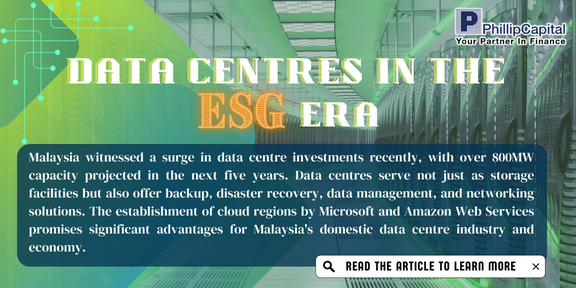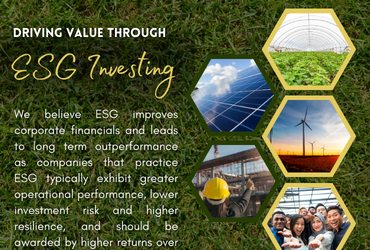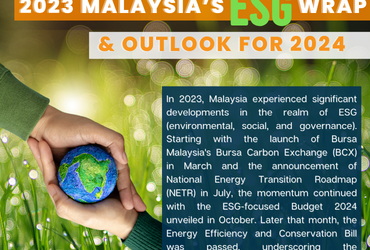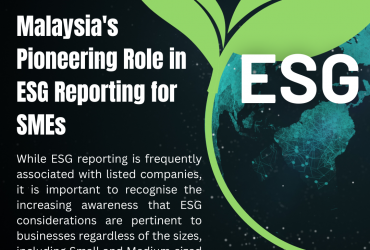
Malaysia witnessed a surge in data centre investments recently, with over 800MW capacity projected in the next five years. Based on Frost & Sullivan’s 2020 forecast, the ASEAN DC market is projected to grow by 18% p.a. between 2020 and 2025, i.e. from US$2.5b to US$5.7b. During this period, the local DC market is poised to grow from US$214m to US$602m. Data centres serve not just as storage facilities but also offer backup, disaster recovery, data management, and networking solutions. Attracted by lower land and energy costs, companies like Equinix, AirTrunk, and GDS Holdings are establishing facilities in Malaysia, specifically in Johor. Additionally, the establishment of cloud regions by Microsoft and Amazon Web Services promises significant advantages for Malaysia’s domestic data centre industry and economy.
Data centres are secure facilities housing critical data and equipment, consisting of traditional on-premises setups and even remote facilities managed by cloud service providers (CSPs). They consist of racks, servers, and high-powered equipment for processing, storing, and managing data. Core components include switches, routers, storage systems, and application delivery controllers, requiring robust infrastructure such as power systems, cooling, and connectivity. However, data centres require significant power, notably with electricity used for cooling systems consuming around 86% of total energy according to IEA. Their contribution to roughly 3% of global carbon emissions, on par with the aviation industry, has sparked heightened attention to ESG considerations.
Globally, data centre operators are committing to achieving Net Zero emissions by 2030, with some aiming for absolute zero emissions through enhanced efficiency and renewable energy adoption. Efforts to reduce embodied carbon (i.e. CO2 emitted during the construction phase) involve sourcing sustainable materials and utilizing local inputs (to reduce the importation of raw materials). Sustainable innovations include hydrogen fuel cells as alternatives to fossil fuels to power DCs and advanced cooling technologies are also helping to reduce carbon emissions. One good example is Alibaba Cloud’s commitment to transitioning its global data centres to run entirely on clean energy by 2030, beginning with upgrades to five of its hyperscale data centres in China. Also, Singapore’s pilot Data Centre – Call for Application (DC-CFA) program is also targeting a data centre power usage effectiveness (PUE) ratio of 1.3x or lower for new and expanded facilities, much lower than the benchmark of 1.5x. PUEs of 1.5x and below conveys higher DC efficiency.
Malaysia is attracting global data centre players due to its favorable conditions. It offers ease of access, lower cost of entry and abundance of land mass at competitive prices. Furthermore, low electricity tariffs and plans for renewable energy (under National Energy Transition Roadmap or NETR) are also important factors for consideration. Connected to numerous submarine cables, Malaysia ensures excellent connectivity. Furthermore, Malaysia ranks as Southeast Asia’s second most digitally advanced country, with strong banking and ecommerce sectors, conducive business environment, skilled workforce, infrastructure, and government support. These factors position Malaysia as an attractive destination for data centre investment.
Investment opportunities within the data centre theme often centre around established telecommunications companies, as data centres are crucial assets for enterprise services, complementing extensive submarine cable ownership. Although there are no exclusive data centre firms listed on Bursa Malaysia, investors could look at construction-related and service-oriented companies integral to the broader value chain with then the data centre space. The examples provided below are not comprehensive:
- TENAGA (Power Consumption)
- YTLPOWER (YTL Green DC Park, AI Data Centre Development, Nvidia Partnership)
- TM (Provider of Data Centre Co-location & Cloud Services (under TM One))
- TIMECOM (AIMS Data Centre)
- SUNCON & GAMUDA & IJM (Contractor for Data Centres)
- VSTECS & SNS (Distributors of Hardware Components for Data Centres & Cloud Software)
- KJTS (Provider of Facility Cooling Solutions)
- CLOUDPT (Supplier of Data Centre Networking & MEP Solutions)
- CRITICAL & HEGROUP (Providers of Mechanical, Electrical & Process (MEP) Services)
- MNHLDG (Specializing in DC Substation Engineering)
- PWRWELL (Supplier of Electricity Distribution Products (i.e. electrical low voltage switchboards, active harmonic filter and uninterrupted power supply) for Data Centres)
- MCEMENT (sole supplier of cement in the southern region)
- CRESCENDO (sold 3 plots of land in Johor (RM543m) for DC projects)
Source: Various, compiled by PCM, Disclaimer: these mentioned stocks are not recommendations
Due to timely position in data-centre related plays such as TENAGA, YTLPOWER, SUNCON, MNHLDG, GAMUDA and etc, our funds have achieved impressive performance year-to-date, as highlighted in our previous write-up. We will continue to seek for alpha ideas within the large and small to mid-cap space, investing in companies with strong fundamentals, sustainable business models, clear earnings visibility, and a high-quality management team.
Please click on the link to learn more or email us at cse.my@phillipcapital.com.my if you require any further information.
Disclaimer:
The information contained herein does not constitute an offer, invitation or solicitation to invest in Phillip Capital Management Sdn Bhd (“PCM”). This article has been reviewed and endorsed by the Executive Director (ED) of PCM. This article has not been reviewed by The Securities Commission Malaysia (SC). No part of this document may be circulated or reproduced without prior permission of PCM. This is not a collective investment scheme / unit trust fund. Any investment product or service offered by PCM is not obligations of, deposits in or guaranteed by PCM. Past performance is not necessarily indicative of future returns. Investments are subject to investment risks, including the possible loss of the principal amount invested. Investors should note that the value of the investment may rise as well as decline. If investors are in any doubt about any feature or nature of the investment, they should consult PCM to obtain further information including on the fees and charges involved before investing or seek other professional advice for their specific investment needs or financial situations. Whilst we have taken all reasonable care to ensure that the information contained in this publication is accurate, it does not guarantee the accuracy or completeness of this publication. Any information, opinion and views contained herein are subject to change without notice. We have not given any consideration to and have not made any investigation on your investment objectives, financial situation or your particular needs. Accordingly, no warranty whatsoever is given and no liability whatsoever is accepted for any loss arising whether directly or indirectly as a result of any persons acting on such information and advice.






